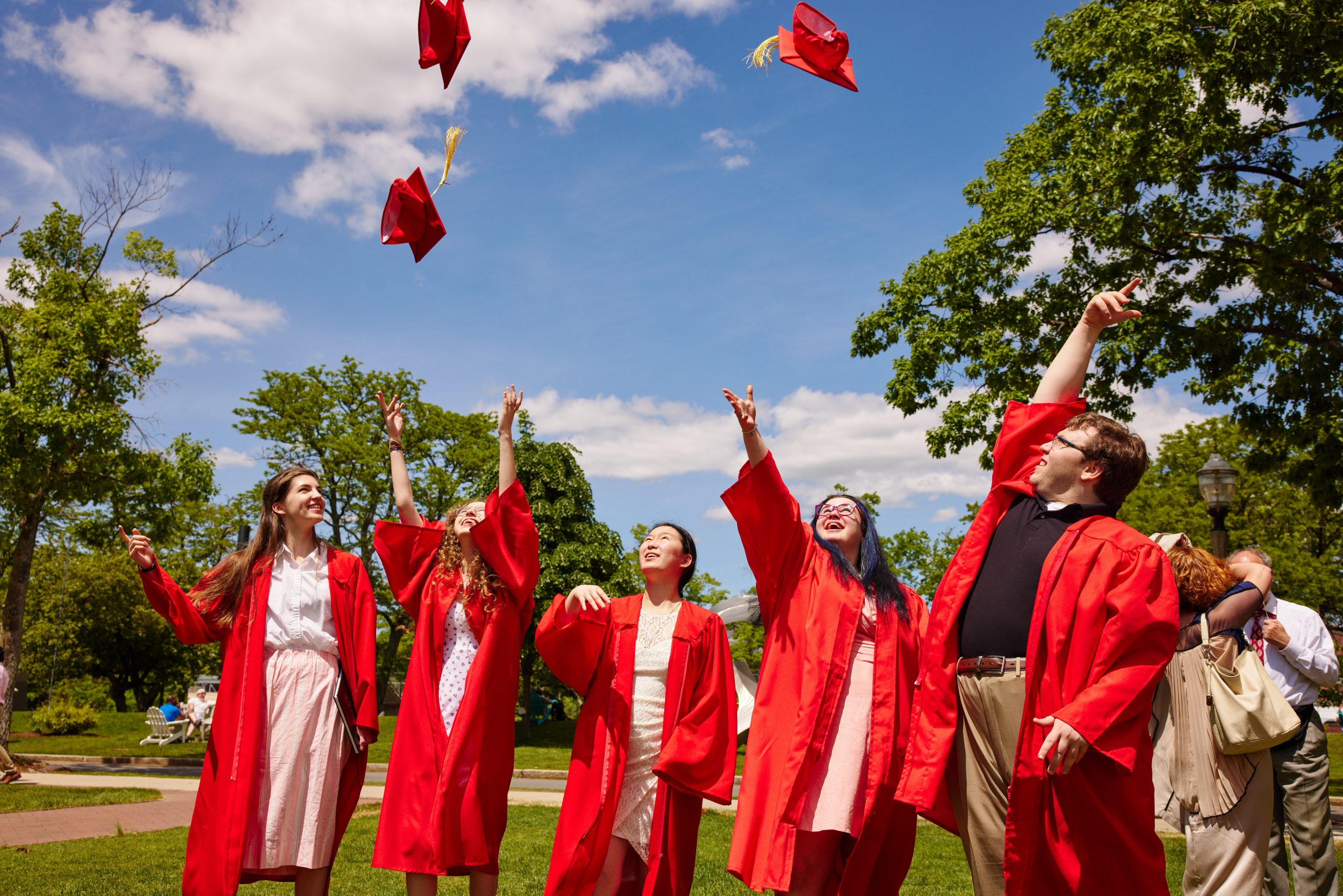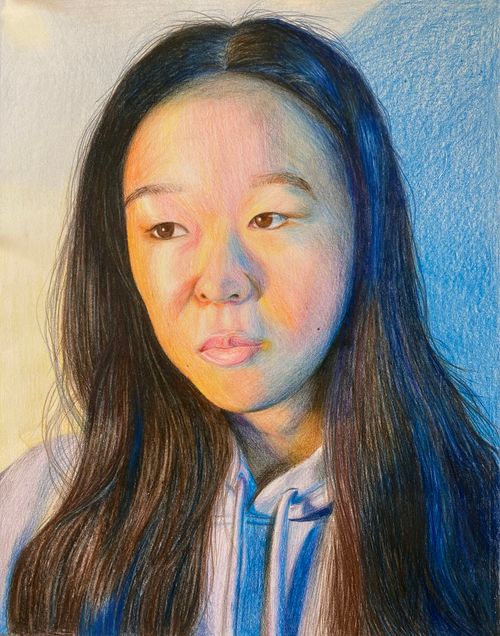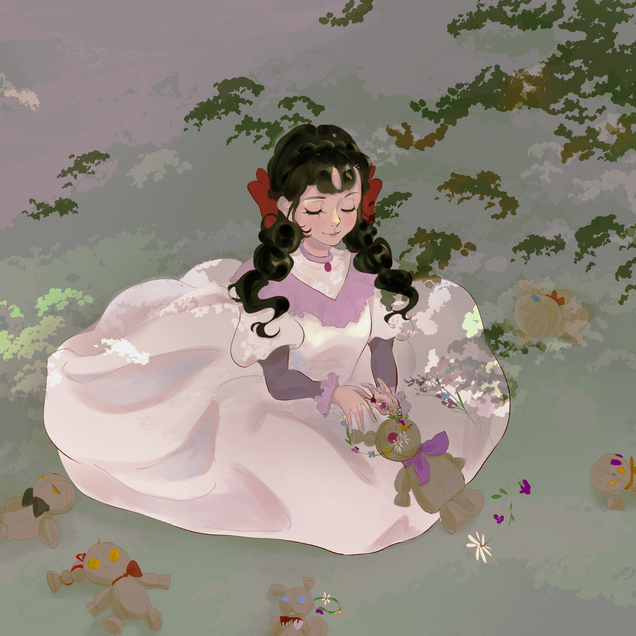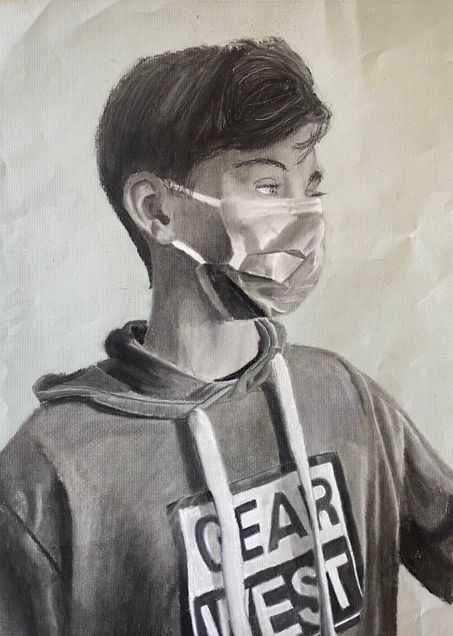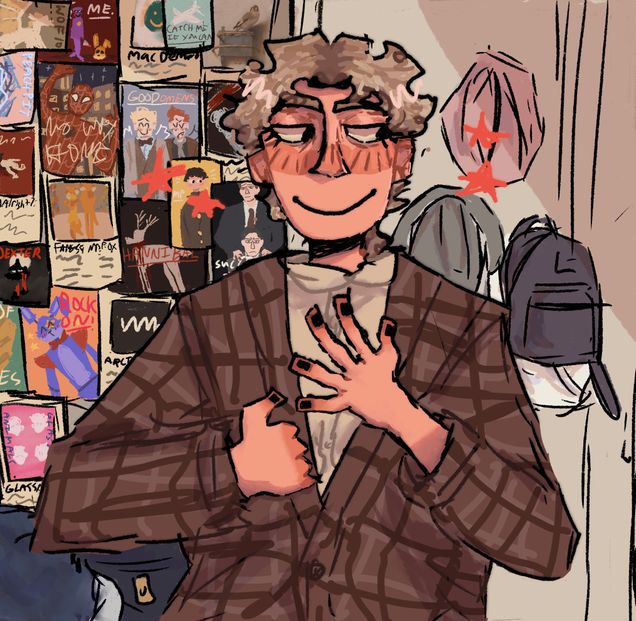News
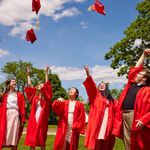
Class of 2022 Matriculation List
As our most recent graduates head off for the summer, we wish them the very best of luck on the next step of their journeys at college and beyond.
From California to Canada, down the block and across the Atlantic, and many places in between, the BUA Class of 2022 is making their mark on the world. Check out the matriculation list below to see where they're headed this fall. We couldn't be prouder of you, Class of 2022. Send us a postcard, and don't forgot to stop by for a visit when you're in town -- you'll always have a home at BUA!
Members of the the Class of 2022 will attend the following institutions in the fall:
Boston University (13)
Bowdoin College
Brown University
University of Chicago (2)
Colorado College
Cornell University (2)
University of Florida
Hamilton College
Harvard University
Massachusetts Institute of Technology (3)
University of Michigan-Ann Arbor
New York University (3)
Northeastern University (4)
Princeton University (2)
Queen’s University
Rensselaer Polytechnic Institute (2)
Rhode Island School of Design
University of Southern California
Tufts University (2)
University of Warwick
Yale University
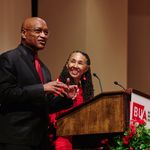
Revs. Ray and Gloria Hammond Deliver Keynote Address at BUA Commencement
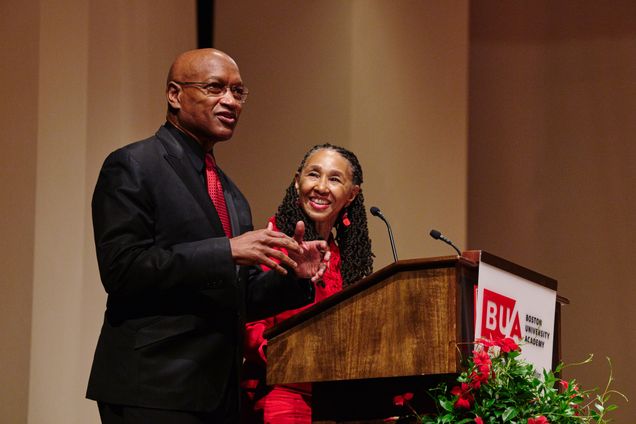 On Monday, May 23, Boston University Academy hosted its 28th commencement exercise at BU's Tsai Performance Center. The 45 members of the BUA Class of 2022 crossed the stage to receive their diplomas from Boston University Provost and Chief Academic Officer Jean Morrison and BUA Head of School Chris Kolovos. Dustin Zhang '22 and Henry Chuang '22 recited the Classics orations in Latin and Greek, respectively. Mell Aguiar '22 and Tanay Nambiar '22 delivered the student addresses. Following the ceremony, graduates and their families celebrated with a reception under the tent on BU Beach.
On Monday, May 23, Boston University Academy hosted its 28th commencement exercise at BU's Tsai Performance Center. The 45 members of the BUA Class of 2022 crossed the stage to receive their diplomas from Boston University Provost and Chief Academic Officer Jean Morrison and BUA Head of School Chris Kolovos. Dustin Zhang '22 and Henry Chuang '22 recited the Classics orations in Latin and Greek, respectively. Mell Aguiar '22 and Tanay Nambiar '22 delivered the student addresses. Following the ceremony, graduates and their families celebrated with a reception under the tent on BU Beach.
Reverend Dr. Ray Hammond and Reverend Dr. Gloria White-Hammond, co-pastors of the Bethel African Methodist Episcopal (A.M.E.) Church, jointly delivered this year's Commencement keynote address. The Hammonds, partners both in life and work, are pillars of social justice and community activism in Boston.
Ray Hammond and Gloria White-Hammond co-founded Bethel A.M.E. Church in Boston's Jamaica Plain. The son of a Baptist preacher and a schoolteacher in Philadelphia, Rev. Ray Hammond attended public schools before earning degrees from Harvard College and Harvard Medical School. He later earned a master’s degree in religion, focusing on Christian and medical ethics, from Harvard Graduate School of Arts and Sciences. Rev. Hammond is co-founder and chairman of the Ten Point Coalition, an ecumenical group of Christian clergy and lay leaders mobilizing the Greater Boston community around issues affecting black and Latino youth. Rev. Gloria White-Hammond is a retired pediatrician from the South End Community Health Center. She is a graduate of Boston University (BA); Tufts University School of Medicine (MD); and Harvard Divinity School (MDiv), where she currently serves as the Resident Practitioner in Ministry Studies. She is also co-founder and executive director of My Sister’s Keeper, a women-led humanitarian and human rights initiative that partners with diverse Sudanese women in their efforts toward reconciliation and reconstruction of their communities. Both Ray Hammond and Gloria White-Hammond hold honorary degrees from Boston University.
In their keynote address, trading turns with their remarks, Rev. Hammond and Rev. White-Hammond drew on their own formative experiences -- Ray Hammond leaning on the support of his peers, despite being one of the few African-American students at his Philadelphia high school, and then later in college and medical school; Gloria White-Hammond finding support from a professor during a rocky first undergraduate semester at BU -- to emphasize the importance of supportive community.
Rev. Gloria White-Hammond shared:
"For you, the graduates, this is a day of making memories. And for those of us who are watching you graduate, there are inevitable emotions of pride and joy. We have the joy of watching young people as bright and gifted and imaginative as each of you are come to this major milestone in your lives. You are the children that we -- and we include ourselves -- dreamed about, and prayed for, and so longed to see. You have made all of us laugh and cry, frequently at the same time.
On this day we celebrate the immense joy you have brought to all of our lives, and the high hopes that we have for you and for your future. This is your day, because it could not have come to pass without your individual commitment to hard work and sacrifice. And this is our day, because it could not come to pass without the gift of collective support from the people gathered around you today. Never forget the power of supportive community to enhance learning, to promote powerful and lasting change, and to have fun while you're doing it."
Picking up on the thread, Rev. Ray Hammond continued:
"And keep your concern for justice. Shirley Chisholm, the first African-American woman elected to the US House of Representatives used to say that 'service to others is the rent that you pay for living on the planet.' It's my understanding that many of you share that commitment to serving others, trying to make our world a fairer, more equitable, and a more just place. It's evident in the work you've done in your senior theses; it's there in your community service and a host of student-led initiatives you've been a part of.
And you know as well as I do that these past few years haven't been just about a pandemic called COVID. It's also been about protest. And racial justice and equity. It's also been about political polarization and turmoil and what we do about that as a nation and a democracy. It's been very much about climate change, as we literally watch large parts of our country on fire. You've been writing about and talking about and working for change in all these areas. But after 55 years of social justice activism, we can tell you if you think that supportive community and collaboration is powerful in your education, it is indispensable if you're going to do the kind of social justice change that sticks, that lasts, and that really shifts the way the world works."
It was our privilege and honor to host Ray and Gloria Hammond as this year's commencement keynote speakers, and we are grateful for the warmth, humor, and words of wisdom they shared with our graduates and all of the assembled guests last Monday. The Hammonds's complete remarks are available here. The full video of BUA's 28th commencement ceremony is available here.
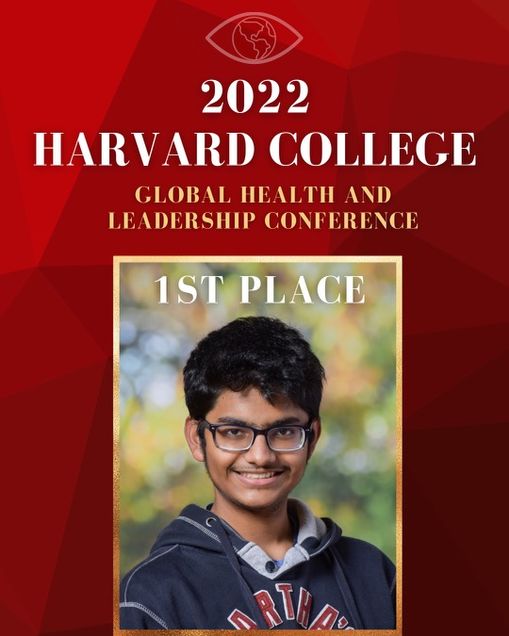
BUA Junior Wins First Place at Harvard Global Health & Leader Conference
 BUA junior Aditya Venkatesh '23 presented a proposal entitled "Learning to Love Learning: A Positive Feedback Loop Approach to Combating Procrastination" at Harvard's Global Health and Leader Conference on April 23-24 as part of the Community Pitch Competition, in which students research and design a health-related project that they want to implement in their home communities.
BUA junior Aditya Venkatesh '23 presented a proposal entitled "Learning to Love Learning: A Positive Feedback Loop Approach to Combating Procrastination" at Harvard's Global Health and Leader Conference on April 23-24 as part of the Community Pitch Competition, in which students research and design a health-related project that they want to implement in their home communities.
Aditya's pitch, which focused on the topic of procrastinative behaviors in middle- and high-school students, won first place. Aditya hopes to implement research-based methods to combat procrastination, including meditation and mindfulness techniques, in schools and in greater Boston communities at large. The proposal stems from an article Aditya wrote in his freshman year at BUA entitled "Understanding procrastination through action control," which was a top 50 winner of the Harvard College Undergraduate Research Association (HCURA)'s Brevia Research Writing Competition.
Aditya writes:
"This project is very near and dear to my heart. I started thinking about this project during my freshman year at BUA. I saw a rise in procrastination amongst students during the onset of the Covid-19 pandemic and I wanted to understand why students procrastinate to their own detriment. Upon researching this extensively, I wrote an article for the Harvard BREVIA magazine . At that time, I had looked at procrastination from a scientific and biological standpoint. In this project, I wanted to continue the work to understand how procrastinative behaviors can be modified."
Read Aditya's winning proposal here. Congratulations, Aditya, on this impressive accomplishment; we look forward to finding ways to integrate your work here at BUA!
HOS Blog: Kids Being Kids
Yesterday’s afternoon all-school trip to the Red Sox game was just what we needed. Several teachers and I were seated a few rows in front of the students. I spent much of my time looking up at them rather than at the field. Some of that had to do with the fact that my brother is the big baseball fan in the family and that I tend to zone out after a few innings. The bigger reason, though, was that I was just so happy to be watching our kids being kids: eating hot dogs and ice cream; laughing; singing along to Sweet Caroline; dancing in their seats; cheering on the Sox despite the scoreboard; and clearly loving being together in the fresh air. It all felt so normal.
When you combine the exigencies of the past few years with the typical challenges students take on in a school like this, there have been too few moments where our kids can just be kids. Yesterday was a reminder to me of the importance of continuing to step toward normalcy, however cautiously, and an encouraging sign of what’s ahead. Happy spring, everybody.
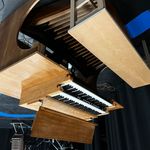
Music Instructor Dr. Brett Abigana Builds BUA its Own Organ
Over the past many months, BUA Music Instructor Dr. Brett Abigaña has been toiling away in his basement, building BUA its very own organ -- a thing of beauty and a true labor of love. In a note to the BUA community on April 29, Dr. Abigaña wrote:
 "We have a lot of very cool stuff here at BUA. But if there was one instrument we’ve never had but could really use, it was an organ. In the past, we would have spring concerts at Marsh Chapel, and we were lucky enough to use their beautiful Casavant organ. But we have since outgrown that space, and have found ourselves limited by not having access to a large organ we could call our own. So when the pandemic shut the music room doors, I decided I’d use the time to our advantage, and two years later, BUA is the proud owner of our very own French-style symphonic organ!
"We have a lot of very cool stuff here at BUA. But if there was one instrument we’ve never had but could really use, it was an organ. In the past, we would have spring concerts at Marsh Chapel, and we were lucky enough to use their beautiful Casavant organ. But we have since outgrown that space, and have found ourselves limited by not having access to a large organ we could call our own. So when the pandemic shut the music room doors, I decided I’d use the time to our advantage, and two years later, BUA is the proud owner of our very own French-style symphonic organ!
The instrument uses Hauptwerk software, a virtual pipe organ that allows users to download amazingly high-quality sample sets from hundreds of famous organs around the world. These samples take the concept of detail to another level, allowing users to hear not only the notes and timbres of the organs (some of which have up to 30,000 pipes!), but also the acoustics of the church, the sound of the wind chest, the sound of moving pedals, pulled stops, and even of dust being blown out from a 32-foot pipe!
Our instrument currently has two manuals (and can be expanded later), a full-sized pedal board, and five different organ samples sets from organs ranging from a small Medieval Organ Positiv to the gigantic 44-stop Friesach Organ, currently housed in a 12th-century Austrian church. The console was designed and built in my basement, and is made of American cherry wood.
We will christen BUA’s organ with Mahler’s Symphony no. 2 “The Resurrection,” at the Spring Concert next Friday."
From our entire community, thank you, Dr. A., for your tireless devotion to BUA's music program, to improving the experience of our students, and for constantly working to make our school a better place. We are so incredibly lucky to have you!
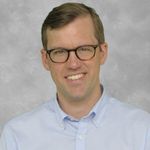
BUA Welcomes Robert O’Rourke as Next Director of College Counseling
In an April 28 letter to the BUA community, Head of School Chris Kolovos announced the appointment of Robert O'Rourke as BUA's next director of college counseling. He writes:
After a highly competitive nationwide search, I’m delighted to announce that Mr. Robert O’Rourke will be joining BUA as our next Director of College Counseling beginning in July. Mr. O’Rourke comes to us from Groton School, where he has served as Associate Director of College Counseling since 2014, partnering with hundreds of students and families in the college process and forming deep connections with colleges and universities around the country and overseas. He has also made it a point to be deeply engaged in the broader school culture, serving as the Director of Community Engagement with oversight of the school's service initiatives; leading global education trips to the Dominican Republic, India, and South Africa; and teaching an Ethics course to seniors. Before Groton, Mr. O’Rourke was a Senior Assistant Director of Admissions at Georgetown University, playing a central role in that institution’s undergraduate admissions program and gaining experience that has informed his subsequent work with high schoolers. He earned a bachelor’s degree in Spanish and theology from Georgetown University. He later completed a master’s degree in theological studies at Harvard Divinity School, where his coursework focused on contemporary American religions and public policy.
I am grateful to everyone who was part of this search process – faculty, staff, students, and two parents of seniors – who met each of the finalists and offered valuable perspective. In a strong pool, Mr. O’Rourke stood out. His background at both the secondary school and university levels give him experience, perspective, and valuable connections. He is a “school person” through and through, eager to be part of the rich fabric of this school community. And he combines well earned confidence with deep humility and empathy. I am not surprised that he was this community’s clear choice.
Mr. O’Rourke is eager to jump into his role at BUA and to get to know us better:
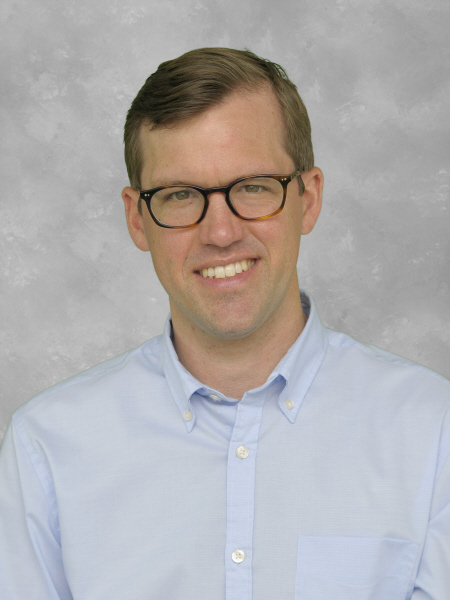 “I consider it a privilege to accompany students on the path from high school to their post-secondary lives and routinely find myself inspired by their intellect, courage, and optimism. I am thrilled to have the opportunity to lead the college counseling team at BUA and to build on the excellent program currently in place. I was deeply impressed with the bright, engaging, and kind students I met during my visit to campus and energized by their palpable enthusiasm for the BUA community and its core values. I am eager to collaborate with BUA faculty, administrators, and parents to support these emerging scholars and leaders. I can’t wait to get started!”
“I consider it a privilege to accompany students on the path from high school to their post-secondary lives and routinely find myself inspired by their intellect, courage, and optimism. I am thrilled to have the opportunity to lead the college counseling team at BUA and to build on the excellent program currently in place. I was deeply impressed with the bright, engaging, and kind students I met during my visit to campus and energized by their palpable enthusiasm for the BUA community and its core values. I am eager to collaborate with BUA faculty, administrators, and parents to support these emerging scholars and leaders. I can’t wait to get started!”
HOS Blog: The Most Rigorous Work a High Schooler Can Do
This is the week when our seniors present their senior thesis projects. Through their year-long studies, they have explored topics ranging from the housing crisis to haptic assistive technology; bessel beams to the resource curse; quantum mechanics to playwriting; white dwarf systems to reaganomics. They have written well researched, compelling, and sometimes publishable papers on those topics, and presented to their peers, advisors, and families.
And they have definitively answered the question of what is the most rigorous work a high school student can do.
Our job as educators is to prepare students for their futures, not our past. The senior thesis does that; the skills a student masters to produce this kind of work are the skills that they will need to be productive, successful, and impactful in college, in the workplace, and in their communities: identifying not just an area of passion, but a problem worth solving or issue worth exploring; developing and executing a plan to conduct research and process a large amount of data; iterating and adapting as the data leads in directions different than a hypothesis; reaching and supporting conclusions with evidence; communicating those conclusions in a compelling way in writing and in person; staying on task over a period of months and seeing a project through.
What’s also inspiring to me is that, through this project, students not only gain skills but see that they can make change. That impact can be small: changing the mind of one person in the audience during the presentation. Or it can be large: producing a published paper that cancer researchers will read and build on; or making the case for white roofs across BU to combat the heat island effect on campus. Our society needs the leaders and change agents that our students will – and have already – become.
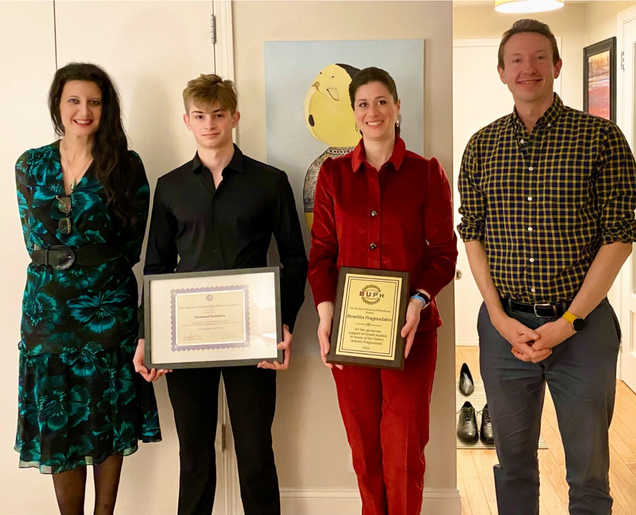
BUA Junior Wins Inaugural Antonis Fragoudakis Memorial Award
 Boston University's Department of Classical Studies named BUA junior Emmanuel Smirnakis '23 the inaugural winner of the Antonis Fragoudakis Memorial Award. The award, established in 2022 and funded by a generous gift from Prof. Roselita Fragoudakis in memory of her father, will be given out annually to a student who demonstrates outstanding achievement in the study of Modern Greek language and culture at Boston University. Read more about the award here. Mega kudos to Emmanuel on this remarkable achievement.
Boston University's Department of Classical Studies named BUA junior Emmanuel Smirnakis '23 the inaugural winner of the Antonis Fragoudakis Memorial Award. The award, established in 2022 and funded by a generous gift from Prof. Roselita Fragoudakis in memory of her father, will be given out annually to a student who demonstrates outstanding achievement in the study of Modern Greek language and culture at Boston University. Read more about the award here. Mega kudos to Emmanuel on this remarkable achievement.
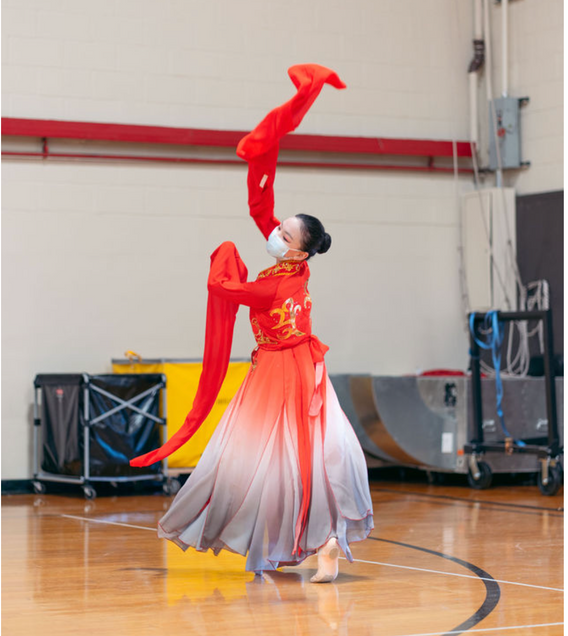
Celebrating BUA’s Global Community at Be Together Event
On Friday, April 8, over 200 students, parents, siblings, faculty, and staff gathered in a transformed BUA gym to for the school's first in-person community event in over two years! Families contributed a wealth of dishes from all over the globe, from Chinese moon cakes and Ethiopian injera, to Lebanese kishk pies and Norwegian lefse. Performances included Bollywood dance, songs from the BUA Music Fusion Club, Greek folk music from Head of School Chris Kolovos and his father, Demetrios Kolovos, and more! It was so wonderful to be together once again, and we look forward to making this event an annual tradition.
Thank you to all the volunteers and performers who provided their time, talent, and the many delicious treats!
View a photo gallery of the Be Together event here.
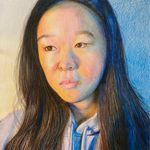
BUA Student Artists Win Accolades in SISAL Art Show
Congratulations to this year's Small Independent School Arts League Art Show (SISAL) winners:
1st Place - Drawing: Michelle Qian ‘24
1st Place - Photography: Sitarah Lakhani ‘22
3rd Place - Digital Art: Angie Zhong ‘22
Honorable Mention - Drawing: Robbie Mulroy ‘24
Honorable Mention - Digital Art: Ava Brilman ‘25
If you missed the virtual SISAL Awards Art Show on April 8, watch the complete recording here.
View the winning artwork below:
